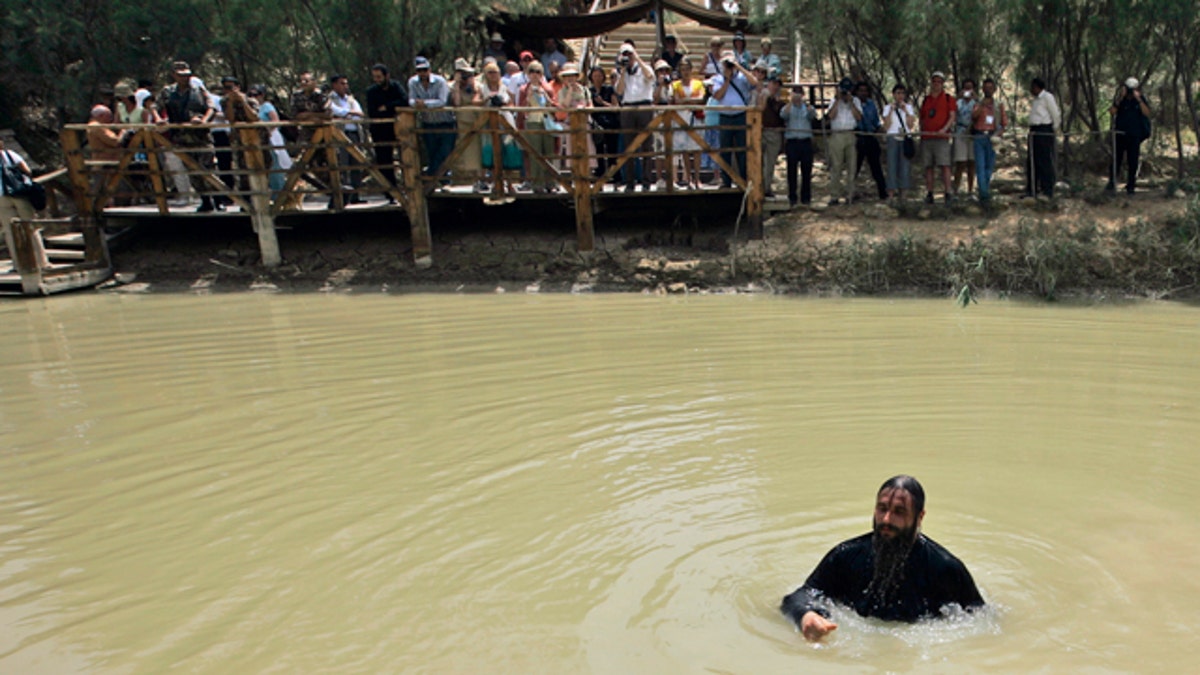
FILE - In this Tuesday, April 22, 2008 file photo, a Christian Greek Orthodox priest bathes in the Jordan River after it was blessed during a baptism ceremony in the waters of the Jordan River at Qasr-el Yahud near Jericho, in the West Bank, during Holy Week. (AP)
Operators of tours to the Holy Land are defending their services, yet proceeding with caution, in response to reports that one of the holiest sites in Christendom may pose serious health concerns.
Israeli officials are reassuring Christian pilgrims that the Jordan River, where many Christians go to be baptized, poses no health risk, despite reports from environmentalists that the waters are dangerously polluted.
The environmentalist group Friends of the Earth contends that high levels of coliform bacteria from sewage in the river have made it unsafe for bathing. But water tests released this week prove otherwise, Eli Dror of Israel's Nature and Parks Authority told Reuters.
"There's absolutely no problem with the quality of the water. People can come and baptize here as much as they want, I guarantee it," Dror said.
Israeli officials strongly denied any problem and pointed out that they had received no health complaints.
Tour operators, meanwhile, said they were not alarmed by the report.
"This destination has increased in popularity in the last few years, and [the baptisms] are such a small component of our tour that people focus on a lot of other things," Lael Kassis of Go Ahead Tours said.
"Israel has a religious history dating back thousands of years, so people will go for the incredible history and culture. And parts of the river are cleaner than others, so I don't hear any comments."
The Lower Jordan is a murky stream cut off from its source in the Sea of Galilee by the needs of towns and agribusiness and topped with waste water and runoff. But Israeli officials and tour providers say they work hard to provide a safe experience for people coming to be baptized in the river, and they say Friends of the Earth's claims should not scare visitors away.
"This site is one of the most important, most holy sites of the Christian people and they come from all over the world, so we're investing a lot of money to prepare it," Raphael Ben-Hur, an official with the Senior Ministry of Tourism, told Reuters. "It would be crazy to allow pilgrims to immerse themselves in pollution."
Jocelyn Pimm, managing director of Worldwide Christian Travel, agrees.
"People go just to be baptized in the River Jordan so the site is well-managed, specially designated for baptism with proper facilities, and I've never had complaints about pollution," Pimm said. "We have more people traveling to Israel now than we have ever had."
She said people will continue to go to the river regardless of the pollution reports, because there are so many historical and religious aspects to the pilgrimage.
"People will go just go to see the site without being baptized," Pimm said. "One person in about every 10 groups asks to be baptized. It's a very small number."
But Friends of the Earth insists the Jordan River is no place for a baptism.
"We've known for a long time that these waters are not healthy," Friends of the Earth's Gidon Bromberg told Reuters. "For most of the year they are four times more polluted than Israeli standards would permit.
"People who baptize in these waters presently, if they have a cut in their skin, could quickly develop a rash. If they swallow any of the water they could develop a stomach upset and start vomiting," he said.
Friends of the Earth alleged that competition for tourism may have persuaded Israeli authorities to bend health norms in the interest of keeping the industry booming there. But Dror said the group's health risk allegation was a scare campaign designed to promote its wider agenda -- to get Israel and Jordan to restore a third of the river's inflow from Galilee and return the river to better health.
"Of course it could be much better," Dror told Reuters. "But we need the water. We don't have any other choice."
Dror, referring to water quality assessment statistics, explained that the Lower Jordan contains large quantities of saline water from the upper Galilee, farm runoff, water from fish farms and partially treated sewage from a buried pipe -- but not "raw sewage" as charged by environmentalists.




















